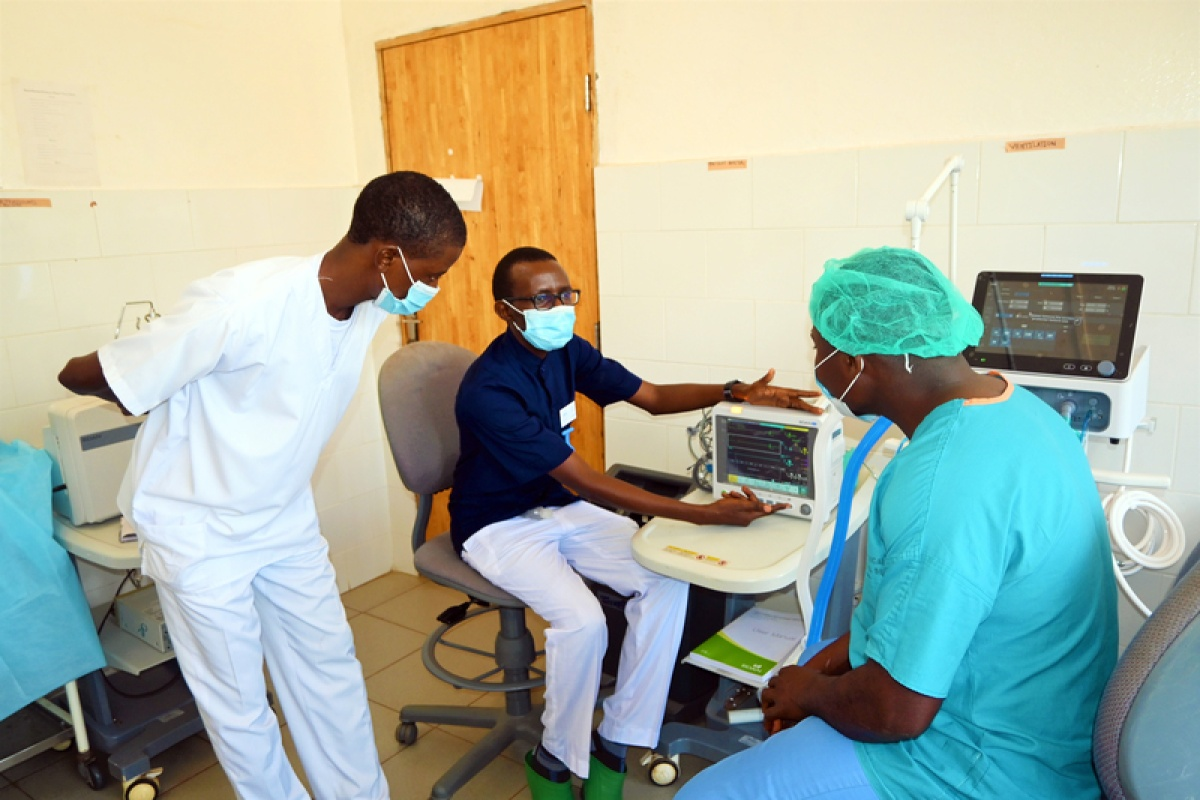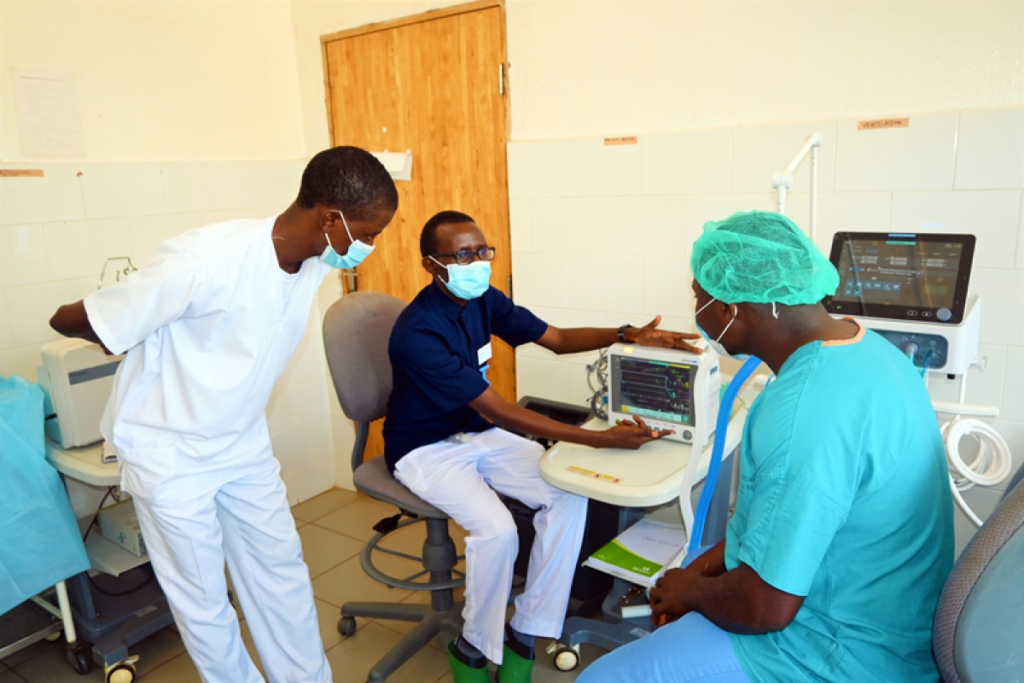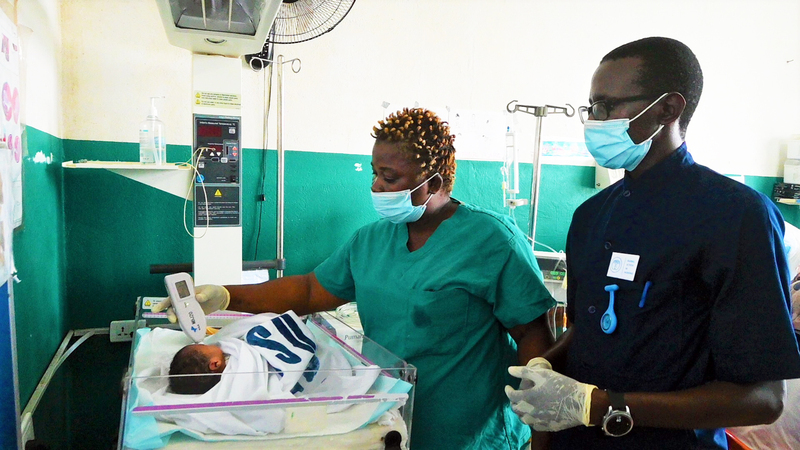Q&A: Addressing Nursing Shortage Through Education, Research in Liberia

PIH Liberia’s Daniel Maweu discusses the Nursing Center of Excellence
Posted on Oct 28, 2021

Like many countries around the globe, Liberia has a shortage of nurses and midwives. In an effort to address this, Partners In Health (PIH) Liberia created the Nursing Center of Excellence in 2019 to recruit more health care professionals, while also providing high-quality training and research opportunities. Investing in the next generation of nurses and midwives—who account for nearly 50% of the global health workforce—is vital to developing strong health systems.
Daniel Maweu, nurse-midwife and reproductive health care educator, has played a key role in the development of the Nursing Center of Excellence. For nearly a decade, he has worked in education roles and across clinical settings in Kenya and Liberia to help build resilient maternal health systems while advocating for dignified maternity care for all women. Since 2018, Maweu has worked with PIH Liberia at J.J. Dossen Memorial Hospital and Pleebo Health Center.
In the interview below, which has been edited and condensed for clarity, Maweu discusses the importance of the Nursing Center of Excellence, its impact on staff and patients, and the challenges they face.
What is the Nursing Center of Excellence?
The Nursing Center of Excellence was designed to be a model for the nursing practice and it’s built on a foundation of compassionate, high-quality, evidence-based, and interdisciplinary care. It encompasses five pillars: leadership; clinical education and mentorship; research and innovation; advocacy, practice, and quality improvement.
Why was it created?
Liberia faces a severe shortage of nursing specialists and midwives—health workers who are critical to the nation’s progress toward universal health coverage and the United Nation’s Sustainable Development Goals. As frontline workers, nurses are often the first and sometimes the only contact patients have at all levels of the health system. We expect that shifting specific roles and tasks to nurses and empowering them will go a long way toward achieving universal health coverage. The center is therefore investing in strengthening Liberia’s nursing capacity through innovation and development in health and health care—particularly in primary care, the management of non-communicable diseases, and the development of new approaches to health promotion, prevention, and literacy. Ultimately, the goal of the center is to build excellence in nursing care through education and the promotion of research in nursing.
Who qualifies for the program?
Every registered nurse, midwife, and new nursing graduate in the hospitals we support qualifies for the program, which is in its formative stage. Structures are still being laid down to build partnerships with other institutions and to recruit nurses for various scholarships. The program will utilize J. J. Dossen Memorial Hospital [for clinical training], and Tubman University will be the main hub [for medical education and theory]. An additional network of facilities, including the Deanna Kay Isaacson School of Midwifery, Phebe College of Health Sciences, and various sites across PIH’s network, will be involved. Priority nursing specialty programs are oncology, anesthesia, critical care, midwifery, and neonatology. A scholarship for high school graduates interested in enrolling in nursing and midwifery programs was introduced in September.
How many people are enrolled?
Currently, 50 nurses and 20 midwives at J.J. Dossen Memorial Hospital and Pleebo Health Center are enrolled in the program. All nurses working within the facilities we support receive mentorship and support from partner institutions.

How does the center impact health care delivery?
One of the challenges identified in Liberia’s health workforce is not simply the shortage of health professionals but also the level of training and experience in the current workforce. The lack of health care professionals has led to an increased demand for skilled nurses to fill positions in nursing, which is the largest sector in the healthcare industry. Developing the competencies to become an excellent nurse relies on the education and mentorship the nurse receives in their baccalaureate program and, therefore, quality education is a must. The Nursing Center of Excellence seeks to create nursing specialists who can adapt to ever-changing health systems. Currently, nurses are forced to take on more responsibilities, which were previously assigned to doctors. Maryland County has only four doctors for its population of about 174,441 people.
What has been the impact of the center since its inception in 2019?
PIH, in collaboration with the Maryland County health team, conducted several non-communicable disease short courses for nurses and physician assistants. The training focused on diagnosis and management of cardiac diseases and diabetes. Some of the key areas addressed were electrocardiogram, basic echocardiography, laboratory tests, management of congestive cardiac failure, hypertension, and diabetes. That short-term work has translated to long-term programming that aims to strengthen patient care on a systemic level. The nurses and physician assistants from this cohort have since been running the non-communicable diseases clinic at J. J. Dossen Memorial Hospital and Pleebo Health Center.
Through on-the-job clinical mentorship of nurses, we’ve been able to ensure that medical-surgical ward nurses have basic critical care nursing skills. The ward is now able to provide basic critical care to very sick patients. The Post Anesthesia Care Unit has since established a short stay critical care unit for critical post-operative patients. Nurses and midwives have also been trained in basic life support.
We’ve also started laying the foundation to create specialized training opportunities for nurses in critical care, neonatal care, nursing anesthesia, and oncology through cross-site collaboration. Four nurses have already received neonatal care and oncology training at the Butaro Cancer Center of Excellence in Rwanda. Upon returning to Liberia, the two neonatal care nurses used their newly acquired skills and knowledge to open the first neonatal care unit at J.J. Dossen Memorial Hospital.
Training scholarships for nurses have also played a role. Two nurses and one midwife are currently enrolled in a master’s in nursing and midwifery program at Mother Patern College of Health Sciences. This team will be expected to provide expertise in nursing and midwifery training at Tubman University upon their return. This has opened the door for discussions on the possibility of having more scholarship opportunities for Liberian nurses in key nursing specialties.
What has been your most memorable experience at the center?
The opening of the J.J. Dossen Post Anesthesia Care Unit has made a big impact in care for critical post-operative patients. My most memorable experience in that unit was working on a case where the team cared for a mother in critical condition, experiencing postpartum hemorrhage following her C-section. The patient had to undergo three major surgeries to control the internal bleeding. In addition, the team was forced to transfuse her with more than 10 units of blood while utilizing other devices like the anti-shock garment to keep her alive. It took three days for the patient to regain consciousness. This type of success was previously unheard of at J. J. Dossen Memorial Hospital, where in the past critical patients would die due to lack of basic care.
What are the challenges you face at the center or in your role?
Apart from anesthesia nursing, there are no other nursing specialty training programs in Liberia. This means that nurses have to travel to other countries for training in specialties such as critical care and oncology. Additional limitations are funds to support future nurses, limited space to create a critical care ward, and a lack of adequate diagnostic and therapeutic equipment at J. J. Dossen Memorial Hospital, which is a major barrier to providing quality nursing care to patients with special needs.
What does the future of the center look like?
We envision that the Nursing Center of Excellence will serve as a beacon of clinical care excellence not only at J. J. Dossen Memorial Hospital, but also Liberia and the West African region. We’re focused on developing and fostering clinical specialties; improving leadership, mentorship, and clinical education; and providing a better educational experience for students.
Ideally, specialties will include critical care nurses, oncology nurses, nurse anesthetists, neonatal care nurses, and a leadership team, as well as programs for nursing advocacy, clinical education, and mentorship. We would like to increase the number of educators and improve the faculty-to-student ratio from 1-to-30 to 1-to-10. This will help provide high-quality nursing and midwifery training at J. J. Dossen Memorial Hospital and Tubman University, as these institutions grow into research and innovation hubs.
Originally published on pih.org



